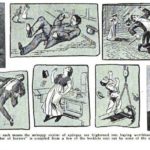Most people would not be ashamed of breaking a leg or falling ill with the flu, and their family members likewise would not mind the world knowing about either condition. However, the same kind of acceptance has rarely applied to mental afflictions. There are many reasons for this lack of acceptance, but early issues included the probability of “getting well” or being permanently cured of a mental problem.
Patients at London’s Bethlehem Royal Hospital (commonly called Bethlem and pronounced Bedlam) were often licensed to beg after discharge. Ex-patients wore a tin plate on their arm as a badge and were known as Bedlamers, Bedlamites, or Bedlam Beggars. The badge and license, though probably initiated from compassion toward an individual who might have a hard time earning a living, also seemed to give a life sentence to the illness he or she had suffered. Londoners could easily see the sign following these former patients and did not wish the same kind of notoriety for their own relatives who might be experiencing mental problems.
Early terminology reflected a desire to view certain mental illnesses as fleeing. A “fit” or a “spell” denoted a short term event. “Brain fever” affiliated a mental affliction with another common, short term illness. When alienists began to assure the public that insanity was curable, that view was eagerly welcomed.
At the Canton Asylum for Insane Indians, however, Dr. Harry Hummer regularly took the view that patients were never really cured. He hesitated to discharge any patient, and usually came up with several excuses concerning their need to stay at his facility. My next post will explore his views.








